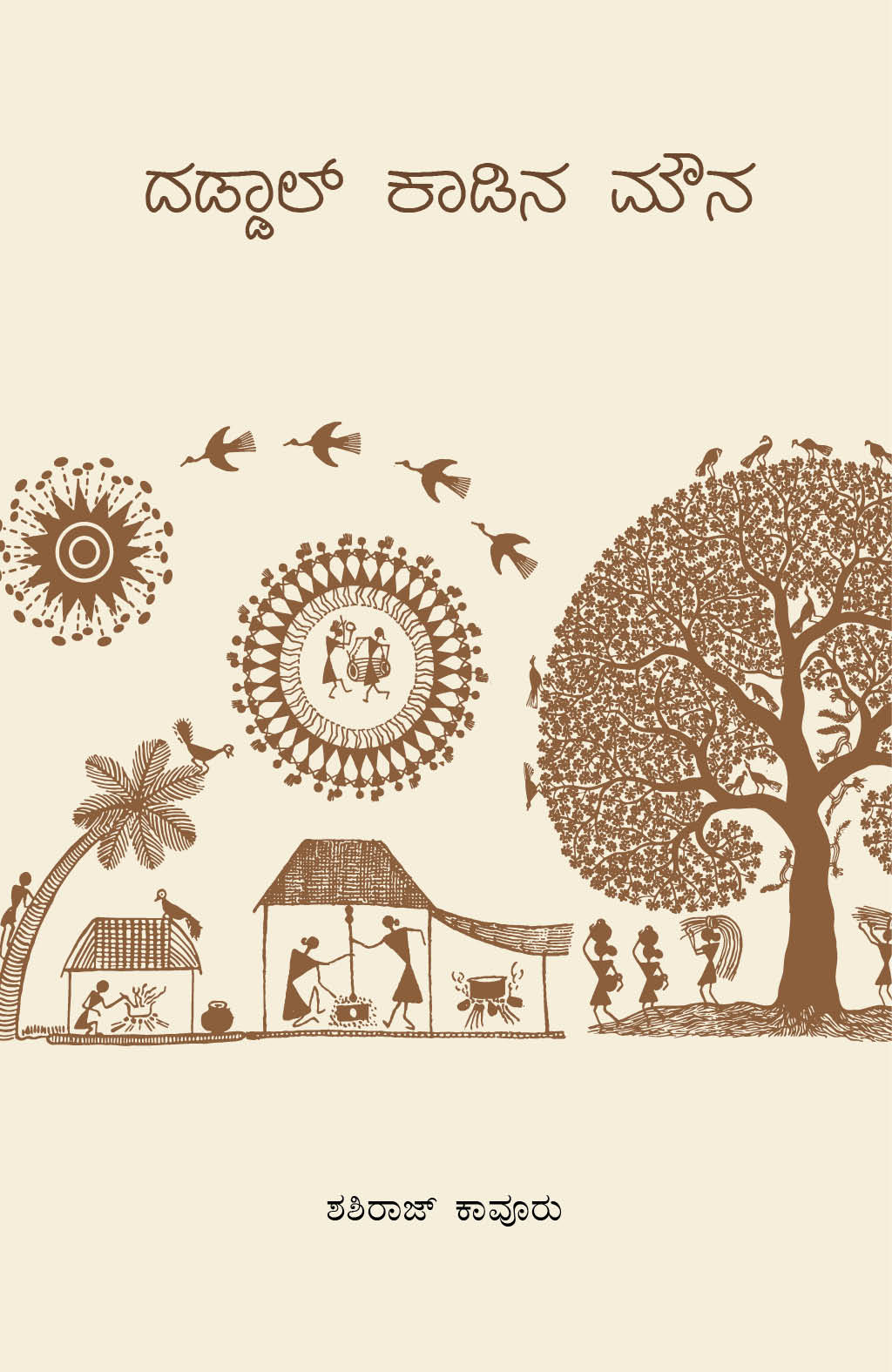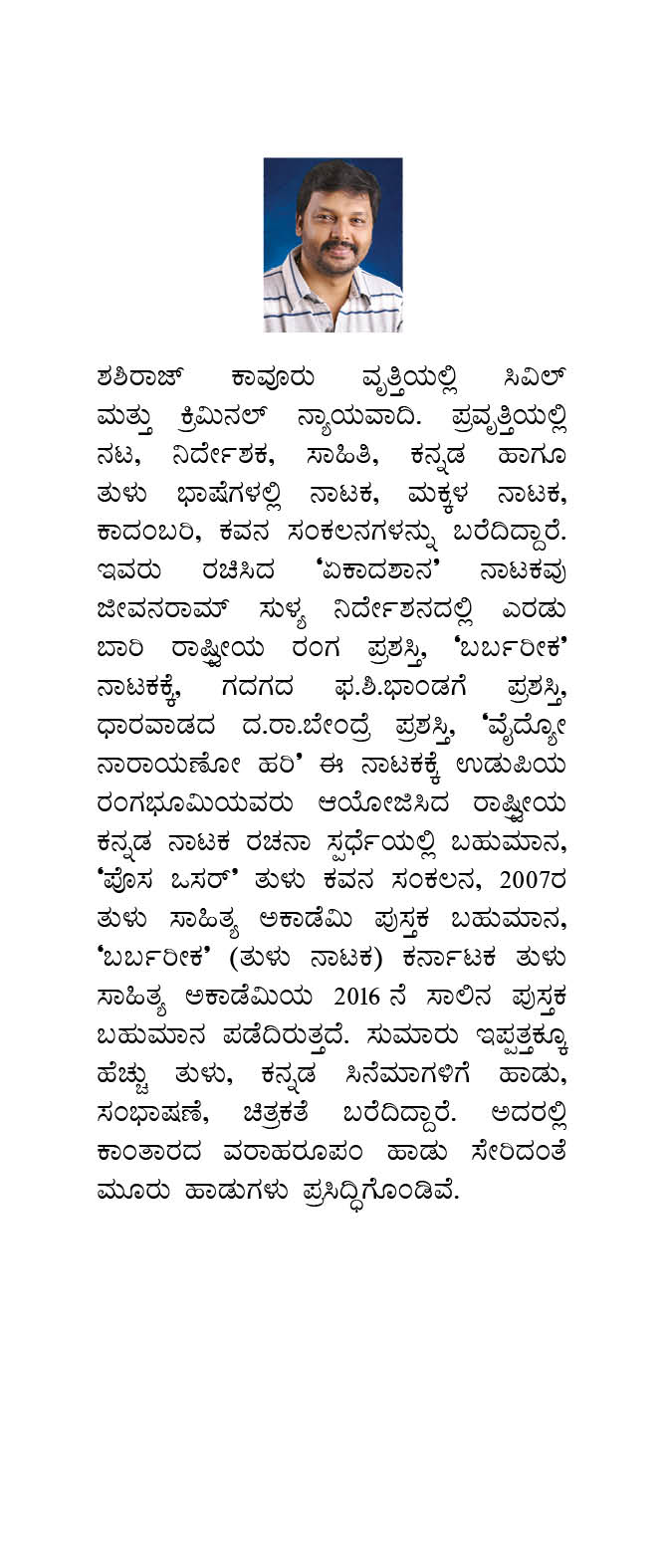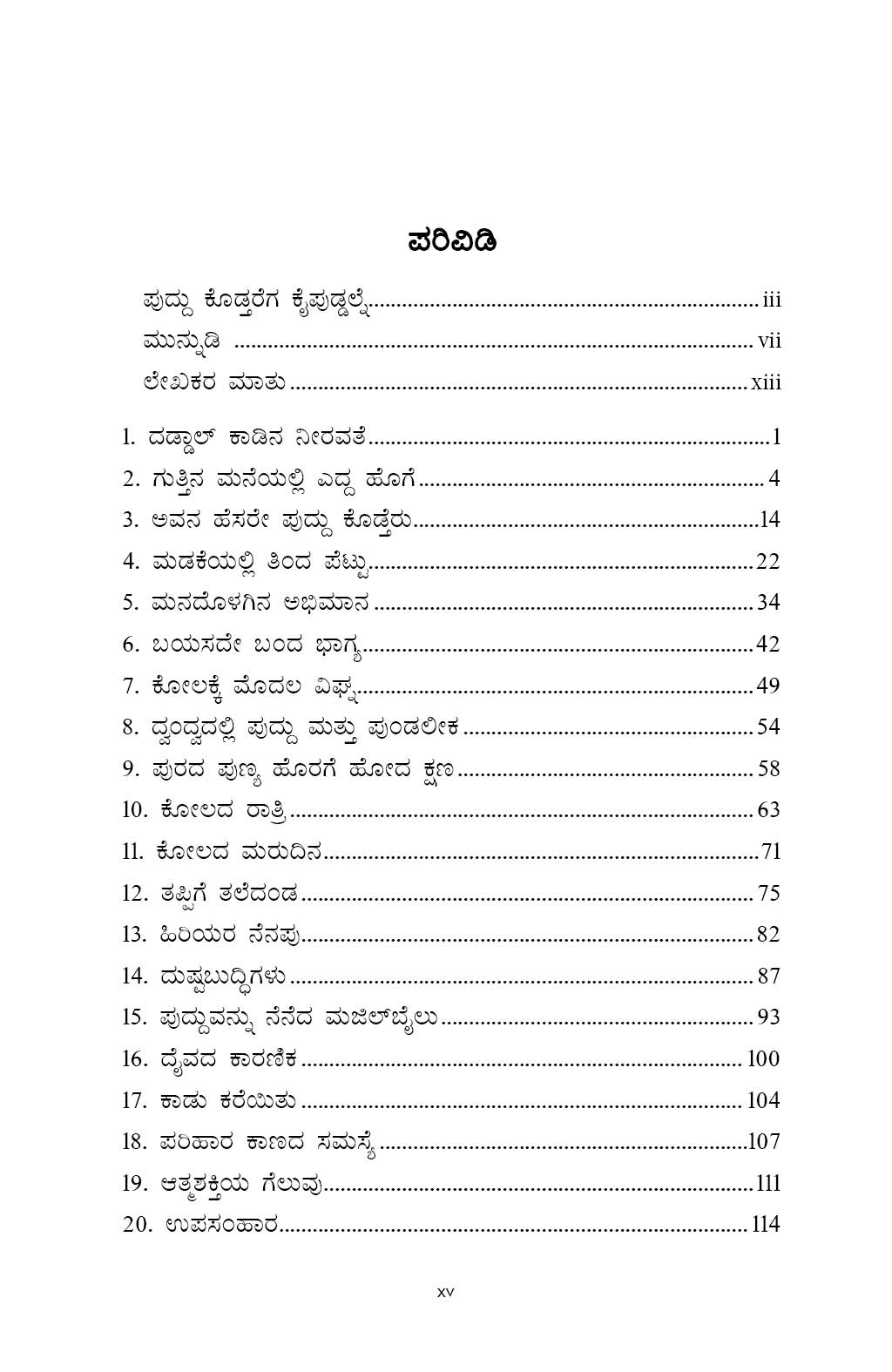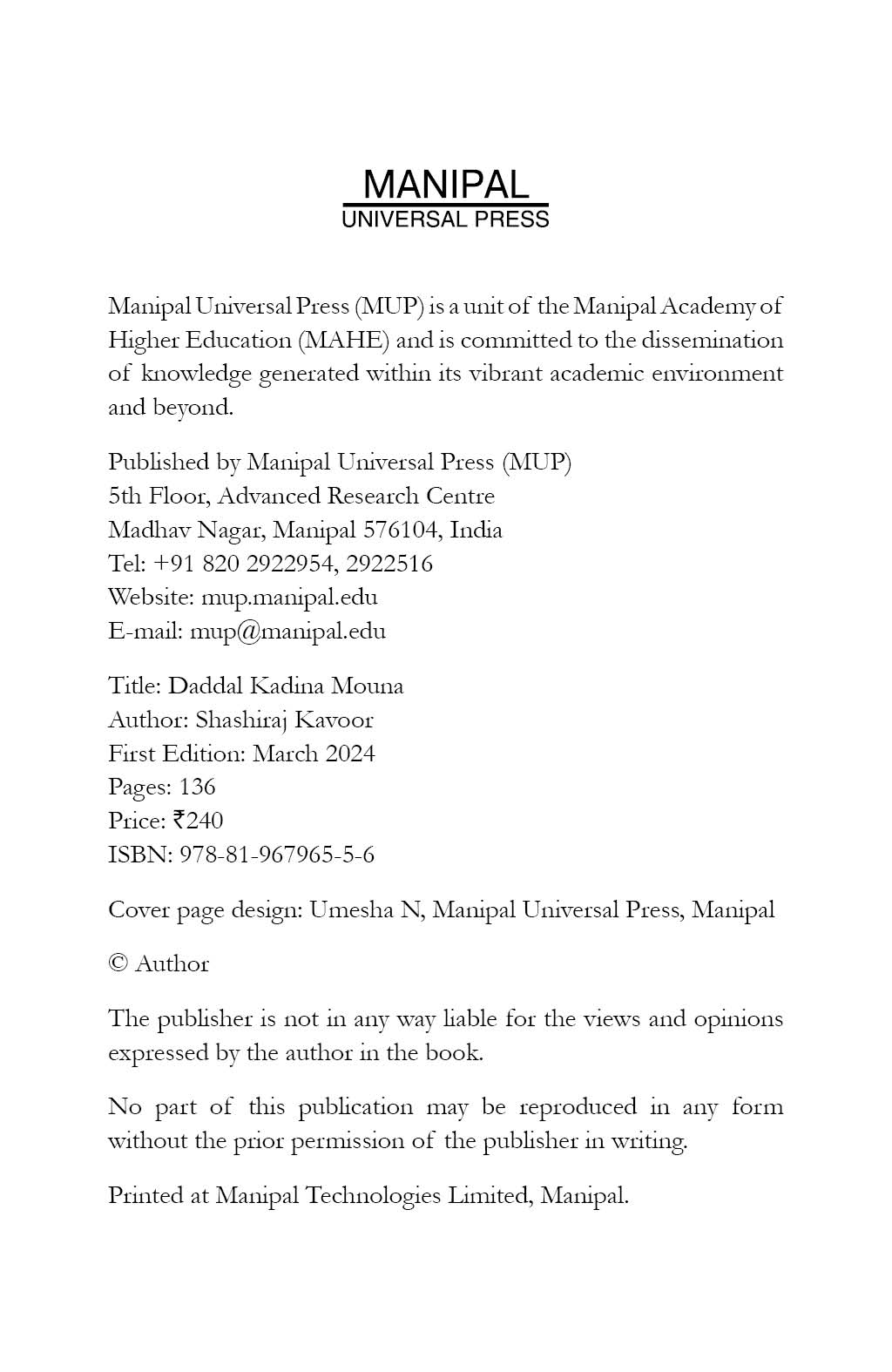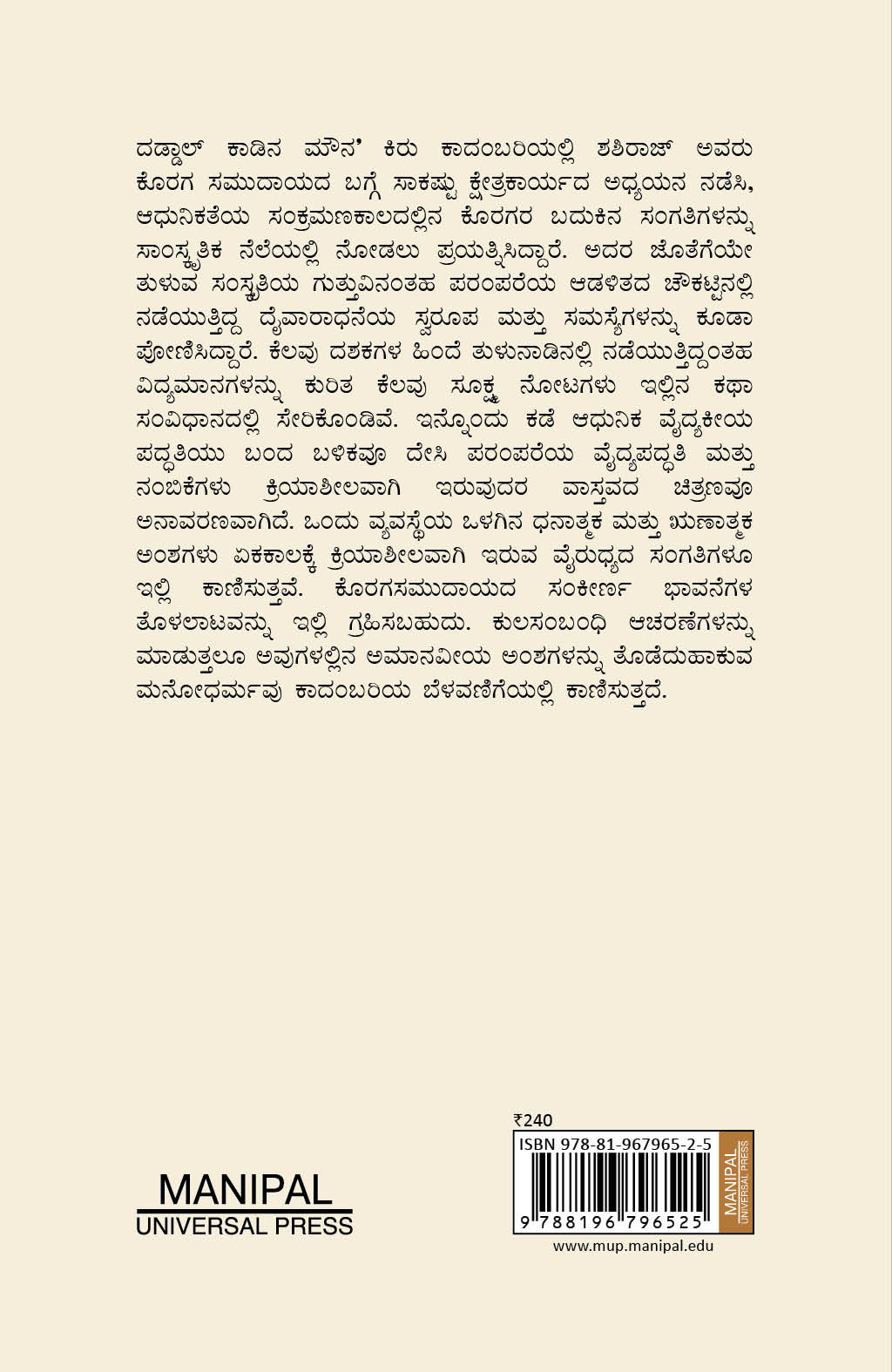Daddal Kaadina Mouna
₹240.00
Author: Shashiraj Kavoor
ದಡ್ಡಾಲ್ ಕಾಡಿನ ಮೌನ’ ಕಿರು ಕಾದಂಬರಿಯಲ್ಲಿ ಶಶಿರಾಜ್ ಅವರು ಕೊರಗ ಸಮುದಾಯದ ಬಗ್ಗೆ ಸಾಕಷ್ಟು ಕ್ಷೇತ್ರಕಾರ್ಯದ ಅಧ್ಯಯನ ನಡೆಸಿ, ಆಧುನಿಕತೆಯ ಸಂಕ್ರಮಣಕಾಲದಲ್ಲಿನ ಕೊರಗರ ಬದುಕಿನ ಸಂಗತಿಗಳನ್ನು ಸಾಂಸ್ಕೃತಿಕ ನೆಲೆಯಲ್ಲಿ ನೋಡಲು ಪ್ರಯತ್ನಿಸಿದ್ದಾರೆ. ಅದರ ಜೊತೆಗೆಯೇ ತುಳುವ ಸಂಸ್ಕೃತಿಯ ಗುತ್ತುವಿನಂತಹ ಪರಂಪರೆಯ ಆಡಳಿತದ ಚೌಕಟ್ಟಿನಲ್ಲಿ ನಡೆಯುತ್ತಿದ್ದ ದೈವಾರಾಧನೆಯ ಸ್ವರೂಪ ಮತ್ತು ಸಮಸ್ಯೆಗಳನ್ನು ಕೂಡಾ ಪೋಣಿಸಿದ್ದಾರೆ. ಕೆಲವು ದಶಕಗಳ ಹಿಂದೆ ತುಳುನಾಡಿನಲ್ಲಿ ನಡೆಯುತ್ತಿದ್ದಂತಹ ವಿದ್ಯಮಾನಗಳನ್ನು ಕುರಿತ ಕೆಲವು ಸೂಕ್ಷ್ಮ ನೋಟಗಳು ಇಲ್ಲಿನ ಕಥಾ ಸಂವಿಧಾನದಲ್ಲಿ ಸೇರಿಕೊಂಡಿವೆ. ಇನ್ನೊಂದು ಕಡೆ ಆಧುನಿಕ ವೈದ್ಯಕೀಯ ಪದ್ಧತಿಯು ಬಂದ ಬಳಿಕವೂ ದೇಸಿ ಪರಂಪರೆಯ ವೈದ್ಯಪದ್ಧತಿ ಮತ್ತು ನಂಬಿಕೆಗಳು ಕ್ರಿಯಾಶೀಲವಾಗಿ ಇರುವುದರ ವಾಸ್ತವದ ಚಿತ್ರಣವೂ ಅನಾವರಣವಾಗಿದೆ. ಒಂದು ವ್ಯವಸ್ಥೆಯ ಒಳಗಿನ ಧನಾತ್ಮಕ ಮತ್ತು ಋಣಾತ್ಮಕ ಅಂಶಗಳು ಏಕಕಾಲಕ್ಕೆ ಕ್ರಿಯಾಶೀಲವಾಗಿ ಇರುವ ವೈರುಧ್ಯದ ಸಂಗತಿಗಳೂ ಇಲ್ಲಿ ಕಾಣಿಸುತ್ತವೆ. ಕೊರಗಸಮುದಾಯದ ಸಂಕೀರ್ಣ ಭಾವನೆಗಳ ತೊಳಲಾಟವನ್ನು ಇಲ್ಲಿ ಗ್ರಹಿಸಬಹುದು. ಕುಲಸಂಬಂಧಿ ಆಚರಣೆಗಳನ್ನು ಮಾಡುತ್ತಲೂ ಅವುಗಳಲ್ಲಿನ ಅಮಾನವೀಯ ಅಂಶಗಳನ್ನು ತೊಡೆದುಹಾಕುವ ಮನೋಧರ್ಮವು ಕಾದಂಬರಿಯ ಬೆಳವಣಿಗೆಯಲ್ಲಿ ಕಾಣಿಸುತ್ತದೆ.
Interested readers may write to us at mup@manipal.edu about purchasing the book.
| Categories: | Kannada, Works in Fiction |
|---|
| Author | |
|---|---|
| Format |
Related products
-
Two Plays – The Sahyadri Saga and The World of Swayamvara
₹199.00Author: Akshara K V Translator: Jayanth Kodkani
These two plays negotiate with the real problems of contemporary India. If Sahyadri Kanda is about the ripples caused in the life of the people in a village on the Western Coast which will soon have a nuclear plant, Swayamvaraloka, is an allegorical narrative set in a small village that extends to include the larger contemporary world. Both the plays dwell on the seeming binaries of village-city, success-failure, modern-traditional while examining the nature of human relationships in the changing world. These plays also reflect an ambition to elevate the real experience to a mythical level. While most playwrights attempt to echo contemporary concerns by reinterpreting history and mythology, for these plays, the epics, their grandeur, the struggle, the wars are not episodes that happen in kingdoms and palaces and battlefields, they are also that which takes place in the microworld of one’s consciousness. Each character in these plays find their own dharma, yet it offers no model for the reader, and remains only a pointer to the complex process of finding it.
Interested readers may write to us at mup@manipal.edu about purchasing the book.
Also available on

eBook available on

-
Defiance
₹495.00Defiance is a captivating tale of the march of globalization and its impact on the lives and times of the Santher Guthu family in Ombathkere, a village located between Mangaluru and Kasaragodu. Set in the picturesque Malabar coast of Karnataka in the late 20th Century, the novel takes the reader through four generations of the family. Ambakke, the protagonist, along with her brother Sankappa Hegde, the third-generation descendants of the family form the lifeblood of this story of human relationships in the midst of time and change. The novel is born out of deep contemplation of a community in the face of transition. There is anxiety that grips this part of Karnataka in the wake of modernity. The vast canvas of the novel and the depiction of folk culture provides a unique touch to the saga of the community. Defiance is a novel about traditions and the fear of losing out to modernity. It is about change and the desire to remain rooted.
Interested readers may write to us at mup@manipal.edu about purchasing the book.
-
Anurakte- The Enamoured
₹390.00Author: Vyasaraya Ballal Translator: Poornima Hebbar
There are many rags-to-riches stories around the city of Mumbai. However, here is a story of transformation of a woman and her true self in the city of dreams. Set in Mangalore and Mumbai of the late 1940s, Anurakte- The Enamoured is an elegantly written story of a woman and her changing worldview over a period of time. Sumithra, a young woman with ordinary dreams and aspirations, comes to the then Bombay in search of livelihood. Little did she know that her experiences in the city and her zest for an independent life would transform her into a different person. She breaks the shell and resolves not to look back. The book is a poignant tale of love, loss, betrayal, family, relationships and traditions. The culturescape of Mumbai beautifully intertwines with her dreams. It is as much a story of the vibrancy of Mumbai as it is about Sumithra’s journey towards freedom.
Interested readers may write to us at mup@manipal.edu about purchasing the book.
-
Kaitan Gandhi’s Freedom Struggle
₹280.00Author: Na D’Souza Translator: B Gangadharamurthy
Kaitan Gandhiya Swatantrya Horata is one of the very few novels written in Kannada on the Gandhian phase of the Indian freedom struggle. It is not globally unknown that Gandhi not only changed the idiom of the struggle and successfully experimented his lifetime-belief in non-violence on the vast canvas but also made it decisively inclusive. Kaitan Gandhi’s Freedom Struggle thematically illuminates these two crucial aspects of the great struggle and grapples with the naked truth as Charles, the priest in the novel revealingly says,The rulers, whosoever it is, are rulers. Caste, colour, or country does not matter to them. All are wicked. Like in all true works of realist literature, the author, here too, creatively blends the individual, the social, and the historical in such a way that the novel poignantly unfolds the true spirit of quest for freedom and humanity.
Interested readers may write to us at mup@manipal.edu about purchasing the book.
-
Akka Mahadevi, the questioning poet-saint
₹255.00Author: D A Shankar
This book presents the mystical ruminations and literary excellence of Akka Mahadevi, the earliest example of a gender-liberated woman writer, credited with the composition of over four hundred and forty remarkably self-explorative Vachanas. Akka Mahadevi represents a powerfully authentic female voice of the radical, egalitarian Sharana Movement, which questioned the socially established barrier between genders and ushered in a world of socio-cultural equality.
In this book, the author explores the questioning spirit intrinsic to Akka Mahadevi’s life and writings, as she questions the widely held conventional norms: the traditional husband-wife relationship, her parents, elders; she questions Basavanna and Allama for their habituated patriarchal manner of speaking, and she bravely questions her personal deity whom she loves and adores. Apart from discerning a credible ‘history’ and background to Akka’s works, this book makes available a rendition of her selectively profound and memorable Vachana in modern English, that crosses the ?the gulf of language and the gulf of time.
Interested readers may write to us at mup@manipal.edu about purchasing the book.
-
The Other Face
₹550.00Author: Na Mogasale Translator: N T Bhat
Set in a fictitious village called Kanthapura in Kasaragod district, Mukhāntara spans across the life of seven generations of a Havyaka Brahmin family. A story about the realities of living in a society marked by caste distinctions, the desire to find communal harmony and the tribulations of the characters through the entirety of the novel, it is also a tale of changing times and people. After unexpectedly coming into possession of a huge portion of land, Thirumalēshwara Bhat of Īshwarīmūle becomes a satisfied man. But childless, Thirumalēshwara Bhat and his wife Pārvathakka decide to adopt Venkappaiah and also give shelter to his widowed mother, Rathnamma. Venkappaiah is to inherit Thirumalēshwara’s vast wealth but when Krishnaiah, the illegitimate child of Thirumalēshwara and Rathnamma is born, rivalry ensues. Through the overlapping narratives of the characters, we get a glimpse into their journey from tradition to modernity. The characters strive to reshape new values when old values are slowly questioned and erased as they move on and are swept along in the waves of globalization.
Interested readers may write to us at mup@manipal.edu about purchasing the book.
Also available on

eBook available on

-
Bamonn: Story of a Konkani Roman Catholic
₹255.00Author: Na D’Souza Translator: S M Pejathaya
Konkani Roman Catholic Christians were converted from other groups by Goan Missionaries long back, keeping the caste system tradition to a large extent in layers such as the Bamonn, the Charodi, the Gawdi, the Nendar, the Shudra, etc. At the time of marriages and other social gatherings they continue to consider caste system norms and customs in the community. Caste system in Indian Christians is vividly described in the novel Bamonn. Christopher Pai of Kalyanpura hails from a Bamonn family and takes great pride in his ancestry. He believes in the stories about his Konkani Roman Catholic ancestors from his elders and about their being true Christians, holding on to their faith despite tremendous pressure to convert to Islam during Tipu Sultan’s regime. He also believes Bamonns are superior to other Christians in the community. After retiring from his job of a Headmaster, he refuels his obsession to retrace his roots and find out the truth about his ancestors. In his journey of self-assurance and faith, will he succeed in his mission to convince his family, his children and the community at large of his glorious ancestry and in still pride in the next generation? . . .
Interested readers may write to us at mup@manipal.edu about purchasing the book.
-
A Shrine for Sarasamma
₹180.00Author: Shivarama Karanth Translator: D A Shankar
A Shrine for Sarasamma is the English translation of Sarasammana Samadhi written by K Shivarama Karanth in 1937, in his early thirties. It offers one of the most authentic and searing accounts of Indian womanhood, which consistently, and through the ages, has suffered deep anguish, humiliation and crushing insult from the oppressive patriarchal culture prevalent in all parts of India and among all castes and classes. The novel is a classic in Kannada and the English translation is an attempt to bring to the English reading audience a taste of the regional classic.
Interested readers may write to us at mup@manipal.edu about purchasing the book.

